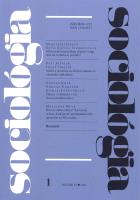Zápasy o sebaúctu v ére zbezvýznamňovania
Struggles for Self-Esteem in an Era of (gradual) Loss of Meaning
Author(s): Zuzana Kusá, Simona Konečná, Dominika OriškováSubject(s): History, Social Sciences, Psychology, Sociology, Psychology of Self, Transformation Period (1990 - 2010)
Published by: Sociologický ústav - Slovenská akadémia vied
Keywords: 1990s; life history narratives; self-esteem; blue-collar workers
Summary/Abstract: Our study follows Alieva’ concept of the process of gradual loss of meaning of self (1994) that reflects outcomes of mass job loss and material insecurity during the economic transformation of the 1990s in Slovakia and focuses on the blue collar families’ experiences in that period from the pragmatist, interactionist and critical theory perspectives (Goffman, Gecas, Schwalbe, Honneth) on self-esteem and dignity as drawing recognition from others and from personal experiences of self-determination. The analysis of the archived life narratives from that period suggests that the loss of paid work did not automatically trigger the process of devaluing self, as the core of self-esteem and identity of blue-collar workers seems embedded in family life that provided more autonomy and recognition from others than their jobs.
Journal: Sociológia - Slovak Sociological Review
- Issue Year: 55/2023
- Issue No: 1
- Page Range: 76-108
- Page Count: 33
- Language: Slovak

